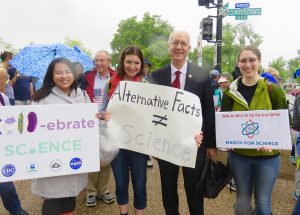BY BAR YOSEF| SQ ONLINE WRITER | SQ ONLINE (2016-17)
____________________________________________________________________________
Today, there is only one PhD scientist in Congress. Bill Foster, the Democrat from Illinois, is a member of the Committee on Science, Space, and Technology and the “go-to-guy for both parties when it comes to technical scientific matters,” which unsurprisingly come up often for a body legislating on issues such as climate change, healthcare, and nuclear weapons (Science Friday). While scientific expertise has always been valuable in politics, the attack on science being perpetrated by the Trump administration has mobilized scientists to strive to end the lack of representation of scientists in Congress.
Michael Eisen, tenured evolutionary biologist at UC Berkeley, is running for senate in 2018. He believes that scientists must run for office in order to defend the role of science in policy making. An organization called 314 Action that supports scientists and engineers running for office has seen an increase in interest. They are organizing a training program for scientist-candidates and connecting them with campaign organizers and donors. 314 Action also has a program called Under the Scope that “magnifies” members of Congress who are anti-science.

Scientists are also countering the attack on science in other ways. Bill Foster participated in the March for Science in Washington D.C. on Earth Day, April 22. The decision to have the march on Earth Day was no coincidence–it was made to incorporate environmentalism into their platform. Trump has pledged to slash the Environmental Protection Agency and has removed climate change references from the White House website. His budget proposal titled “A New Foundation for American Greatness,” delivered to Congress on Tuesday, calls for massive cuts to scientific and medical research. The National Institutes of Health budget would go from $31.8 billion to $26 billion, while the National Science Foundation would see an 11 percent cut.
Although his approach to science may at first appear to be typical of conservative politics, he has shown that if facts go against his agenda, he completely ignores them. In issues related to science, this can be seen in climate change and vaccine safety. He has also failed to name science and technology advisers or staff the office of science and technology following the departure of the vast majority of experts, who advise on research budgets and technological trends and crises.

While some people argue that scientists should let data speak for itself, the Trump administration has shown that it does not value science. They have taken measures to restrict the production and availability of data and also in non-science related issues, Trump has shown to devalue information and knowledge. This has heightened the debate over whether or not scientists should be political, which has been going on for years.
Even before the government became explicitly anti-science, science was political. Most of the funding for scientific research comes from the government and politicians decide how to allocate the funding. Politics are also involved in ethical review boards that decide what research should be done and in committees like the EPA, which determine what to do in response to scientific results. Politics are involved in research from beginning to end, and research can have huge political implications.
Scientists may want to keep science apolitical, but politics cannot be ignored in today’s climate. With the increased politicization of issues like climate change and an attack on fact-based decision making, society can no longer afford for scientists to be apolitical. Scientists should enter politics not only to “stand up for science,” but also because their training in objectively analyzing data can also be valuable in fighting the attack on fact. While I don’t think that every scientist should quit their job in research or technology and run for office, I think that scientists should find their political voices in the age of alternative facts because data, in fact, does not have a mouth.
[hr gap=”10″]
Sources:
- https://www.nytimes.com/2017/02/06/science/donald-trump-scientists-politics.html?_r=0
- https://campaignstops.blogs.nytimes.com/2012/02/13/why-dont-americans-elect-scientists
- https://www.theatlantic.com/science/archive/2017/01/thanks-to-trump-scientists-are-planning-to-run-for-office/514229
- https://www.washingtonpost.com/news/speaking-of-science/wp/2017/01/17/this-group-wants-to-fight-anti-science-rhetoric-by-getting-scientists-to-run-for-office/?utm_term=.9d36b1703be3
- http://www.theverge.com/2017/1/19/14258474/trump-inauguration-science-politics-climate-change-vaccines
- http://www.314action.org
- https://www.sciencefriday.com/segments/theres-a-science-advocate-in-the-house-of-representatives
- https://www.statnews.com/2017/04/05/bill-foster-scientist-congress-march
- http://www.huffingtonpost.com/entry/scientists-should-be-active-but-apolitical-with-david_us_586ac375e4b068764965c3be
- https://www.theatlantic.com/politics/archive/2017/03/trumps-budget-cuts-nih-funding-by-20-percent/519771
- http://www.motherjones.com/media/2013/09/michael-eisen-plos-open-access-aaron-swartz
- https://www.washingtonpost.com/news/to-your-health/wp/2017/05/22/trump-budget-seeks-huge-cuts-to-disease-prevention-and-medical-research-departments/?utm_term=.7dc1a80556d6

